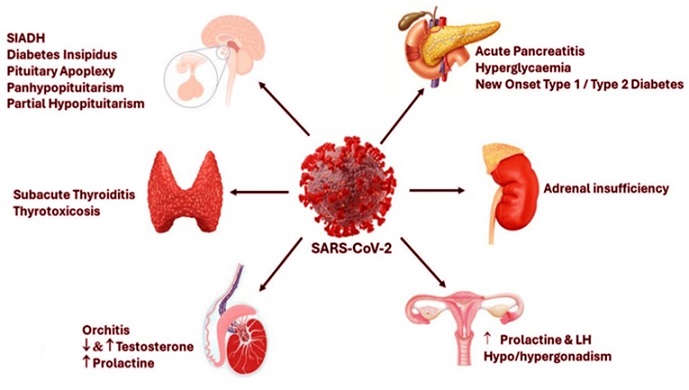Nikhil Prasad Fact checked by:Thailand Medical News Team Jan 14, 2025 11 months, 2 weeks, 1 day, 8 hours, 5 minutes ago
Medical News: The global COVID-19 pandemic has left its mark not only on respiratory health but also on other vital systems, including the endocrine system. Recent research reveals that the SARS-CoV-2 virus, responsible for COVID-19, has far-reaching implications for various hormonal functions. These hormonal effects were recently explored in a study led by a group of researchers from institutions in Kazakhstan and Russia. The institutions involved include Akhmet Baitursynuly Kostanay Regional University, Sechenov University, Lomonosov Moscow State University, and others.
 Hormonal Effects of COVID-19
Unveiling the Connection Between COVID-19 and the Endocrine System
Hormonal Effects of COVID-19
Unveiling the Connection Between COVID-19 and the Endocrine System
COVID-19’s impacts extend beyond respiratory issues. The endocrine system, which regulates hormones essential for various bodily functions, is particularly vulnerable to disruption by this virus. Researchers have highlighted that SARS-CoV-2’s ability to bind to the ACE2 receptor - found abundantly in endocrine tissues - could lead to direct and indirect impacts on hormonal balance.
This
Medical News report explores how these disruptions affect glands like the pancreas, thyroid, adrenal glands, pituitary gland, and reproductive organs. For many patients, these effects could result in long-term health challenges, especially those with pre-existing conditions such as diabetes or thyroid disorders.
The Endocrine Vulnerability to SARS-CoV-2
-Pancreatic Impacts
The pancreas, essential for insulin production, is highly susceptible to SARS-CoV-2. The ACE2 receptors in pancreatic islet cells make it a prime target for viral invasion. Studies indicate that many COVID-19 patients exhibit elevated blood sugar levels, even those without a prior history of diabetes.
Evidence suggests that the virus may impair beta-cell function, which could explain why some individuals develop diabetes after recovering from COVID-19. Hyperglycemia - a hallmark of diabetes - is now a recognized complication of the disease. Notably, individuals with diabetes face heightened risks of severe COVID-19 outcomes.
-Thyroid Dysfunctions
The thyroid gland, critical for metabolism and energy regulation, also bears the brunt of COVID-19’s impact. Researchers noted that thyroiditis - inflammation of the thyroid - was common among infected patients. Symptoms include fatigue, weight fluctuations, and hormonal imbalances.
Subacute thyroiditis and postpartum thyroiditis have been observed in women recovering from COVID-19. Additionally, long-term reductions in thyroid volume and horm
onal shifts underscore the virus’s lasting impact.
-Adrenal Gland Implications
The adrenal glands, which produce stress-response hormones, are not immune to SARS-CoV-2. The virus can infiltrate adrenal tissues, causing inflammation and, in severe cases, adrenal insufficiency. Autopsy studies have revealed hemorrhaging and necrosis in adrenal tissues of COVID-19 victims, indicating the severity of damage.
-
Pituitary Gland Effects
The pituitary gland, though less affected than other endocrine glands, still exhibits vulnerability. COVID-19 patients have shown altered levels of essential hormones like cortisol and thyroid-stimulating hormone (TSH). Changes in pituitary function could further exacerbate issues like adrenal insufficiency and thyroid imbalances.
-Reproductive System Challenges
Both male and female reproductive systems are affected by COVID-19. In men, testicular tissue damage has been documented, leading to reduced testosterone levels and impaired sperm quality. Women have reported menstrual irregularities, including heavier or delayed cycles, likely due to temporary disruptions in hormonal balance.
Broader Implications for Post-COVID Health
COVID-19’s impact on the endocrine system underscores the need for long-term monitoring of survivors. Patients with pre-existing endocrine disorders, such as diabetes or hypothyroidism, face higher risks of complications. Moreover, the virus’s ability to trigger new hormonal disorders highlights a pressing need for comprehensive post-recovery care.
Medications used in COVID-19 treatment may also exacerbate endocrine issues. For example, corticosteroids, commonly used to manage inflammation in severe cases, can induce hyperglycemia and adrenal suppression. Monitoring and managing these side effects are crucial for holistic recovery.
Key Findings from the Study
The study consolidated data from over 100 sources to present a detailed picture of how COVID-19 impacts hormonal health. Key highlights include:
-A significant percentage of patients displayed thyroid dysfunction post-infection.
-Hyperglycemia was prevalent among COVID-19 patients, even in those without prior diabetes.
-Autopsy findings revealed extensive damage to adrenal tissues, indicating severe hormonal disruptions in critical cases.
-Male reproductive health was significantly impacted, with reduced testosterone levels and sperm quality observed in many cases.
-Women reported menstrual irregularities linked to temporary hormonal imbalances caused by the virus.
Conclusion
The study’s findings provide a sobering reminder of COVID-19’s far-reaching impacts. Beyond the immediate respiratory symptoms, the virus disrupts hormonal balance, affecting multiple organs and systems. Long-term health consequences, particularly for endocrine function, require further research and dedicated medical care.
For patients recovering from COVID-19, monitoring endocrine health should become a priority. Addressing issues such as thyroid dysfunction, diabetes onset, and reproductive challenges will be critical in ensuring holistic recovery. Medical professionals must also remain vigilant in managing the side effects of treatments, such as corticosteroids, that could exacerbate endocrine issues.
The study findings were published in the peer-reviewed journal: Scientifica.
https://onlinelibrary.wiley.com/doi/10.1155/sci5/7305185
For the latest COVID-19 News, keep on logging to Thailand
Medical News.
Read Also:
https://www.thailandmedical.news/news/persistent-endocrine-health-challenges-after-covid-19
https://www.thailandmedical.news/news/canadian-study-finds-that-covid-19-causes-unique-endocrine-disruptions
https://www.thailandmedical.news/news/breaking-covid-19-news-american-doctors-warn-that-sars-cov-2-infections-can-cause-endocrine-tumors-and-cushing-s-disease
